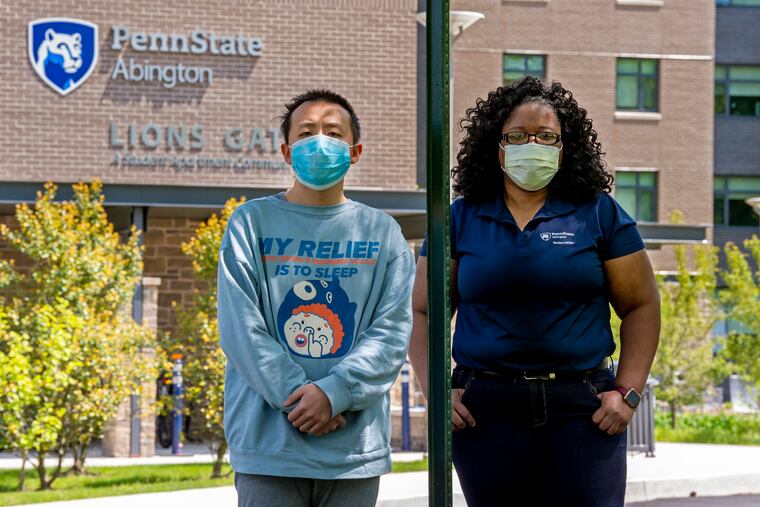Students still on campus: Dozens, in some cases hundreds, couldn’t go home
Many are international students who couldn’t fly home. Others are domestic students who grew up in foster care or have other extenuating circumstances. Most colleges allowed students to stay, providing meal pick up or delivery and other support.

Before the pandemic, the 400-student residence hall at Penn State Abington was abuzz with activity: movie nights, friends visiting each other’s rooms, free events, and food in the lobby.
Now, only 20 students remain, and they can go days without seeing others.
“Sometimes I feel like I get lonely,” said Krish Kabi, 18, a biomedical engineering major from Indonesia, who occasionally ventures out for food or walks.
Throughout the region, dozens — in some cases, hundreds — of students still live on college campuses, months after most were forced to leave as schools moved instruction online. Numbers have ranged from about 100 at Haverford College to 140 at Bryn Mawr College, 200 at Temple University, and 250 at Rowan University and 160 at Stockton University, both in New Jersey.
Many, like Kabi, are international students who couldn’t fly home. Others grew up in foster care or have other extenuating circumstances. Most colleges allowed those students to stay, providing meal pickup or delivery and other support. Cleaning and security staff still work to maintain buildings. Students pay for their housing; earlier this year, universities began refunding or crediting millions in room and board to students who left.
Some students, still unable to get home, likely will remain into the summer. Pennsylvania State University expects about 120 students at its main campus this summer and about 113 at four of its commonwealth campuses: Abington, Berks, Harrisburg and Behrend, said Lisa Powers, a university spokesperson. In some cases, students are concerned they won’t be able to return in the fall if they leave the United States, she said.
» READ MORE: More colleges move to, plan for online classes as coronavirus spreads
Other schools have made provisions, too. At Haverford, students who have not graduated can stay until Aug 1, possibly through the summer, by petitioning the dean.
Keisha Johnson, director of residence life and community standards at Penn State Abington, was on an alternative spring break trip with students in South Dakota in March when the country began to shut down. She returned and saw that undergraduate student staff in the residence hall were leaving for home. That’s when Johnson, after self-isolating for a period in her East Mount Airy home, moved into the dorm to support about 130 students still living there.
» FAQ: Your coronavirus questions, answered.
The campus nurse took over the conference room to make sure students got supplies, including travel kits of masks, gloves, and sanitizer. Another staffer helped students who couldn’t afford flights or didn’t know what to do with their belongings. Staff connected students with a storage company.
Students’ rooms are equipped with kitchens. But the residence hall put out supplies from its food pantry and offered gift cards, Johnson said.
“If there are any supplies I’m lacking, they are always there to provide them,” Kabi said. He has received Lysol spray and hand sanitizer.
The other day, Johnson got a mask for a student who wanted to go out for supplies.
“I don’t know what’s happening to me,” said Johnson, who has worked in higher education for 20 years. “To give a student a mask is exciting. It’s an indicator that they are really listening.”
» READ MORE: Colleges holding on-campus classes in the fall? Maybe
Johnson conducts welfare checks, especially if the university notices a student hasn’t emerged from his or her room for a while.
“We try to be as visible as possible,” she said.
Most students have been able to get home or move in with friends, Johnson said.
“I’m looking forward to going home,” Johnson said. “I miss my bed terribly. But this is not forever. This is just for now, and for now, this is what our students need.”
Kabi wanted to go home in March, but had to get his passport renewed. Then he couldn’t leave, he said. He’s been in touch with the Indonesian embassy. In the meantime, he’s taking an online course and applying for jobs and internships.
» READ MORE: Let the virtual graduations commence: Coronavirus has pushed ceremonies online
Zelin Wan, 19, a finance major from China, has had three flights canceled in the last week. He’ll try to book more, he said. (He didn’t go home earlier because he didn’t want to take his online classes in the wee hours, given the time difference with China.)
But he’s comforted to know, he said, that he could stay at the residence hall this summer if needed.
Sometimes he wanders outside and sits in a grassy area behind the residence hall, a five-story complex that opened in 2017 along Old York Road, or goes to a store selling groceries or pharmacy items. There’s are a Trader Joe’s, Target, and CVS within walking distance.
Mostly, he stays in his room. And he’s become quite the cook because of it. Pork and peppers is one of his favorites.
“Before I didn’t know how to cook,” he said.
Jingyang “Alex” Ji, 19, a fisheries and wildlife science major from China, spends lots of time on his hobby, building ancient European armor models.
But he’s looking forward to going home and has a flight booked for July, he said.
He misses going to restaurants, though he appreciates the vending machines and other food offered by the residence hall.
“It may not be very delicious," he said, "but it is enough that we can stay here.”